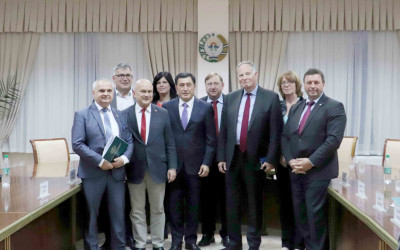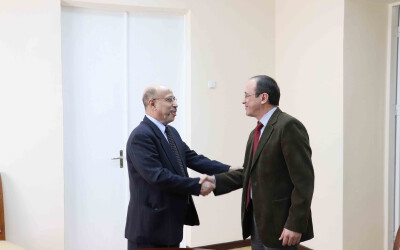Well-Coordinated Work
On October 29, the first meeting of the Central Asian Expert Forum took place in Tashkent.
The event was organized by the Institute of Strategic and Regional Studies under the President of the Republic of Uzbekistan and the UN Regional Center for Preventive Diplomacy for Central Asia.
The meeting was attended by heads of strategic research institutes of Kazakhstan, Kyrgyzstan, Tajikistan, Turkmenistan, Uzbekistan, as well as the special representative of the UN Secretary-General, director of the Regional Center for Preventive Diplomacy for Central Asia, Natalia German.
At the opening of the forum, it was emphasized that its holding once again demonstrates the firm intention of the Central Asian states to turn Central Asia into a prosperous and stable region.
The historical roots of the peoples of Central Asia, cultural, religious and linguistic communities, as well as adherence to universal values are the unshakable foundation for the states of the region to collectively respond to emerging problems, look for effective ways to solve them together and move along the path of progress.
Mutual understanding-based relations of the countries of Central Asia play a crucial role in ensuring peace, security and sustainable development, as well as in expanding regional and international cooperation. ”
In the context of the development of regional cooperation, the past two years have truly become historical and breakthrough.
During this period, previously unprecedented high results were achieved in all areas of interaction. The Central Asian countries demonstrate a strong commitment and enormous potential in the development of constructive cooperation in all areas based on the principles of good neighborliness, mutual benefit and respect, and mutual interests.
Relations between them have reached the level of an in-depth strategic partnership, which is filled with concrete content in the political, economic, cultural and humanitarian spheres.
In a relatively short time, a high level of political trust has been achieved among the countries of Central Asia, and interstate relations in the region are developing according to a completely new paradigm.
A striking example of this was the first consultative meeting of the Heads of State of Central Asia held in March of this year in Astana, which was launched by the President of Uzbekistan in November 2017 at the Samarkand International Conference “Central Asia: One Past and Common Future, Cooperation for Sustainable Development and Mutual Prosperity.”
Today we can confidently assert that the “Samarkand consensus” reached by the countries of Central Asia during this conference became the starting point not only for “resetting” intergovernmental relations in the region, but also for Central Asia to enter a fundamentally new dialogue field with the international community.
The adoption of a special UN GA resolution on Central Asia on June 22, 2018, without exaggeration, was a historic event, marking the beginning of a new phase of regional cooperation.
This is the first UN document in which the overall consolidated position of all five Central Asian states on the most pressing problems of the region was recorded.
In less than two years, mutually beneficial solutions have been reached on the basis of reasonable compromises on a number of critical problems relating to water use, demarcation and delimitation of borders, the resumption and expansion of transport links and mutual electricity supply.
The leaders of the countries of the region showed an unprecedented readiness to eliminate all the conditions and preconditions that fueled the conflict potential in Central Asia.
Addressing the event, Vladimir Norov, Director of the Institute of Strategic and Regional Studies under the President of the Republic of Uzbekistan, noted the readiness of Institute in organizing joint projects and events on topical issues of security and sustainable development of the region, both on a bilateral and multilateral basis, stressing that we are only At the beginning of the road, there is still a lot of work ahead to ensure sustainable development and the common prosperity of Central Asia.
The rapid changes taking place in the modern world in the context of globalization, the growing challenges and threats, and the escalation of tensions in various parts of the world dictate the need for closer and coordinated cooperation among the countries of Central Asia.
In this context, representatives of analytical structures should be at the forefront and act as a core in the development of strategic and forward-looking proposals for jointly solving existing problematic issues and further developing interstate relations.
In particular, V.Norov noted, it would be expedient for Central Asian countries to work out a common strategic concept for the medium and long-term perspectives of regional cooperation, defining specific goals and objectives in the area of ensuring stability, peace and sustainable development in Central Asia, as well as specific ways to achieve them.
The urgency is gained by the intensification of regional cooperation in the following key areas:
first, to ensure the dynamic and advanced development of the economies of the countries of the region by strengthening industrial cooperation, creating joint economic zones, expanding investment cooperation, developing the digital economy, rational use of water resources and taking preventive measures in the field of food security;
second, the development of transport and communication systems and logistics infrastructure, increasing the transit potential of the Central Asian region;
third, the development of common positions and approaches in the fight against religious extremism and terrorism in order to prevent the falling of the youth of the Central Asian countries under the influence of various destructive forces.
The countries of the region need to continue the policy of providing political and economic assistance to Afghanistan for the soonest stabilization of the situation in this long-suffering country;
fourth, the expansion of cultural and humanitarian ties, the creation of combined tourist routes along the Great Silk Road;
and, finally, expanding the possibilities of bilateral and multilateral academic mobility of researchers in the countries of the region with the release of the preparation of the draft Concept of joint research on sustainable development in Central Asia.
The forum addressed the issues of enhancing mutually beneficial trade and economic relations between the countries of the region, the introduction of advanced technologies and innovations, the “digital” economy, and the expansion of transport and transit potential.
An exchange of views took place on such topical issues as the use of water and energy resources, the increase in food production, the development of industrial cooperation and the processing industry.
“The countries of Central Asia are acting in the name of a common goal – building a stable future,” said the head of the foreign policy analysis department of the Center for Strategic Studies under the President of the Republic of Tajikistan, Abdulloh Rahnamo. “The parties have political will to unite opportunities on this path, exchange experience and opinions, rally around a common goal. Today, representatives from think tanks, research institutes involved in the development of the policy and integration concept of their countries have gathered here for the realization of common aspirations. I am sure that this meeting of the new format will play an important role in establishing regular political consultations between our countries, developing and implementing a specific strategy.”
The forum heard reports on cooperation in the spheres of the economy, investment, trade, accelerating integration processes, joint struggle against religious extremism and radicalism, terrorism, drug trafficking and organized crime.
Source: ut.uza

Previous

On 1 November of 2018 the Director of the Institute for Strategic and Regional Studies under the President of Uzbekistan Vladimir Norov met with German Bundestag delegation headed by the Chairman of the parliamentary group «Germany – Central Asia» Manfred Grund.
02.11.2018Next

The ISRS held a meeting with the Deputy head of the mission of the Sultanate of Oman in Uzbekistan A.Al-Shanfari. During the talks, the two sides discussed current state and prospects for the development of relations between Uzbekistan and Oman.
06.11.2018





